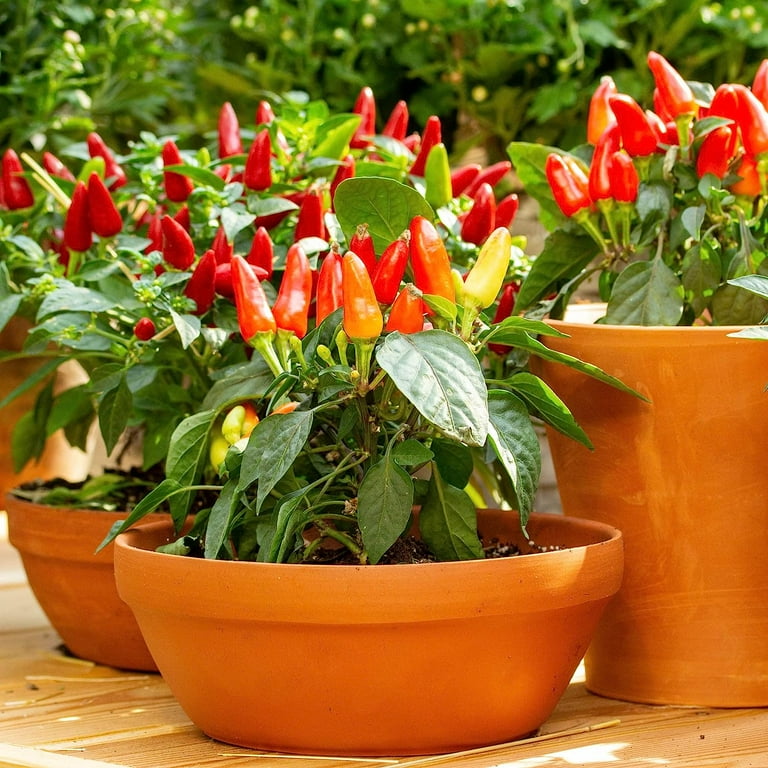Organic Vs. Synthetic Fertilizers: Which Is Best for Nurturing Healthy And Balanced Pepper Plants?
In the world of nurturing healthy pepper plants, the selection in between organic and synthetic plant foods stands as a critical decision with far-ranging ramifications. While both options aim to provide crucial nutrients to sustain plant growth, the subtleties of their effect on the soil, plant health, and the setting stimulate an argument that mirrors throughout the gardening community. Recognizing the distinct benefits and prospective mistakes of each plant food type is essential for pepper farmers seeking to optimize their returns while maintaining an eco-conscious and sustainable approach.
Advantages of Organic Fertilizers
Organic plant foods offer a lasting and environmentally-friendly technique to nourishing pepper plants, supplying important nutrients without the usage of artificial chemicals. These natural fertilizers are obtained from organic sources such as garden compost, manure, bone meal, and seaweed, advertising soil health and biodiversity. Unlike artificial fertilizers, natural options release nutrients gradually, guaranteeing a consistent and balanced supply for pepper plants to thrive.
One significant benefit of natural plant foods is their ability to enhance dirt structure and water retention. By improving dirt wellness, organic fertilizers advertise advantageous microbial task, which assists in nutrient uptake by pepper plants. Additionally, organic fertilizers minimize the threat of chemical run-off, securing water resources from air pollution and protecting the atmosphere.
In addition, organic fertilizers contribute to long-lasting dirt fertility by advertising the development of valuable dirt organisms. These organisms help break down organic matter, launching nutrients in a type that is conveniently obtainable to pepper plants. best fertilizers for peppers. By cultivating a healthy soil community, organic fertilizers support sustainable pepper cultivation methods that benefit both plants and the atmosphere
Disadvantages of Artificial Plant Foods
Artificial plant foods, in contrast to their natural equivalents, position various negative aspects when utilized to nourish pepper plants, influencing both plant health and wellness and environmental sustainability. One significant disadvantage of synthetic plant foods is their tendency to seep nutrients from the soil quickly.
In addition, the overuse of artificial fertilizers can add to water contamination. Excess fertilizers not taken in by plants can wash away right into water bodies, resulting in eutrophication, where algae blossoms deplete oxygen degrees in the water, hurting aquatic life. Artificial plant foods are usually derived from non-renewable sources, such as fossil gas, contributing to carbon exhausts and ecological deterioration throughout their production.
Nutrient Absorption Contrast
When contrasting natural and artificial plant foods in terms of nutrient absorption, organic plant foods have the benefit of supplying a more balanced and slow-release source of nutrients. Organic fertilizers include a range of macro and micronutrients that are not only helpful for the plants yet additionally advertise healthy and balanced dirt microbial task, which assists in nutrient uptake.
In addition, natural fertilizers enhance dirt framework and water retention ability, permitting pepper plants to accessibility nutrients extra successfully. This better dirt top quality promotes origin growth, enabling far better nutrient absorption. Artificial plant foods, although at first increasing plant growth due to their high nutrient focus, might impede long-lasting nutrient absorption by degrading soil wellness gradually.
Ecological Effect Considerations

On the other hand, artificial fertilizers, although frequently even more concentrated and instantly readily available to plants, can have damaging effects on find here the setting if not used correctly (best fertilizers for peppers). Their manufacturing needs high power inputs, resulting in greenhouse gas exhausts and adding to environment modification. In addition, the overflow of excess artificial fertilizers can pollute water sources, causing eutrophication and damaging water ecological communities.
Ideal Fertilizer Practices for Peppers
When fertilizing pepper plants, enhancing nutrient uptake and decreasing environmental impact are essential factors to consider. To achieve this, it is necessary to comply with ideal plant food techniques customized to the specific needs of pepper plants. One important method is to do a dirt examination prior to using any kind of plant foods. This examination can determine the pH level of the soil and identify any nutrient deficiencies, guiding you in selecting the most ideal plant food solution.
Another essential practice is to feed pepper plants at the correct time. Commonly, peppers take advantage of getting plant food at planting and afterwards once more when they begin to flower. Over-fertilizing can result in nutrient inequalities and damage the plants, so it is crucial to comply with recommended application prices.
In addition, selecting a balanced plant food with an NPK ratio that suits pepper plants' needs is essential. Organic fertilizers, such as garden compost or manure, can be exceptional options as they release nutrients gradually and enhance soil framework in time. Artificial fertilizers can provide a quick nutrient increase when needed. Inevitably, integrating natural and artificial fertilizers judiciously can aid nurture healthy and balanced pepper plants while minimizing ecological effect.
Verdict

Organic plant foods offer a lasting and environmentally-friendly approach to beneficial pepper plants, giving vital nutrients without the usage of artificial chemicals. Unlike artificial plant foods, natural options release nutrients gradually, making certain a well balanced and constant supply for pepper plants to thrive.
Synthetic fertilizers, in comparison to their organic equivalents, posture various drawbacks when utilized to nurture pepper plants, influencing both plant wellness and ecological recommended you read sustainability. When contrasting organic and synthetic fertilizers in terms of nutrient absorption, organic plant foods have the benefit of providing a more balanced and slow-release source of nutrients.Additionally, organic fertilizers enhance soil structure and water retention capacity, allowing pepper plants to access nutrients much more effectively.
Comments on “Best Fertilizers for Peppers: Boost Development and Taste Naturally”